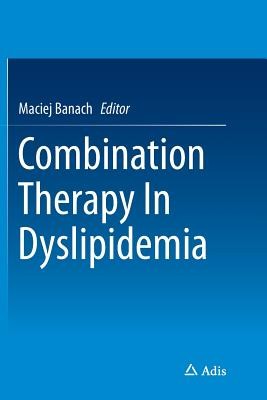
- We will send in 10–14 business days.
- Publisher: Adis
- Year: 2016
- ISBN-10: 3319367218
- ISBN-13: 9783319367217
- Format: 15.6 x 23.4 x 1.2 cm, minkšti viršeliai
- Language: English
- SAVE -10% with code: EXTRA
Combination Therapy in Dyslipidemia (e-book) (used book) | bookbook.eu
Reviews
Description
Comprising contributions from leading lipidologists from around the world, this book presents the latest and most comprehensive knowledge on the different options for combination therapy of dyslipidemia and includes discussion of future therapies that are currently in late stages of clinical evaluation.
Dyslipidemia is a leading cause of cardiovascular morbidity and mortality and most patients with this condition fail to achieve adequate control of their serum lipid levels with monotherapy. However, recent US and European guideline recommendations, based on randomized, controlled trials, fail to discuss combination therapy options for patients with dyslipidemia.
Statins remain the mainstay of drug therapy for hyperlipidemia and chapters in this book specifically examine the role of add-on therapy with different agents modulating the different lipid fractions in the blood, e.g. bile acid sequestrants, fibric acid derivatives (fibrates), omega-3 fatty acids (fish oils), inhibitors of Niemann-Pick C1 like 1 (NPC1L1) protein, cholesteryl ester transfer protein (CETP), apolipoprotein B-100 and microsomal triglyceride transfer protein (MTP) and the emerging proprotein convertase subtilisin/kexin type 9 (PCSK9) inhibitors. There is additional discussion of the role of non-drug therapy options such as nutraceuticals, functional foods and lipoprotein apheresis. The book also discusses the combination of antihypertensive drugs with lipid-lowering drugs in the management of cardiovascular risk in patents with dyslipidemia.
EXTRA 10 % discount with code: EXTRA
The promotion ends in 22d.04:04:32
The discount code is valid when purchasing from 10 €. Discounts do not stack.
- Publisher: Adis
- Year: 2016
- ISBN-10: 3319367218
- ISBN-13: 9783319367217
- Format: 15.6 x 23.4 x 1.2 cm, minkšti viršeliai
- Language: English English
Comprising contributions from leading lipidologists from around the world, this book presents the latest and most comprehensive knowledge on the different options for combination therapy of dyslipidemia and includes discussion of future therapies that are currently in late stages of clinical evaluation.
Dyslipidemia is a leading cause of cardiovascular morbidity and mortality and most patients with this condition fail to achieve adequate control of their serum lipid levels with monotherapy. However, recent US and European guideline recommendations, based on randomized, controlled trials, fail to discuss combination therapy options for patients with dyslipidemia.
Statins remain the mainstay of drug therapy for hyperlipidemia and chapters in this book specifically examine the role of add-on therapy with different agents modulating the different lipid fractions in the blood, e.g. bile acid sequestrants, fibric acid derivatives (fibrates), omega-3 fatty acids (fish oils), inhibitors of Niemann-Pick C1 like 1 (NPC1L1) protein, cholesteryl ester transfer protein (CETP), apolipoprotein B-100 and microsomal triglyceride transfer protein (MTP) and the emerging proprotein convertase subtilisin/kexin type 9 (PCSK9) inhibitors. There is additional discussion of the role of non-drug therapy options such as nutraceuticals, functional foods and lipoprotein apheresis. The book also discusses the combination of antihypertensive drugs with lipid-lowering drugs in the management of cardiovascular risk in patents with dyslipidemia.


Reviews